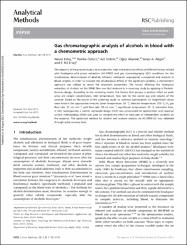Gas chromatographic analysis of alcohols in blood with a chemometric approach
Özet
The objective of the present study is to examine the main and interactive effects of different factors related with headspace-solid phase extraction (HS-SPME) and gas chromatography (GC) conditions for the simultaneous determination of alcohols (ethanol, methanol, isopropanol, n-propanol) and acetone in blood samples. In order to evaluate the simultaneous effects of the significant variables, a chemometric approach was utilized to reveal the important parameters. The factors affecting the headspace extraction of alcohols on the SPME fiber was first deduced in a screening study by applying a Plackett-Burman design. According to the screening results, the factors that possess a positive effect on peak areas are sample concentration, inlet temperature, flow rate for the carrier gas and volume of the solution. Based on the results of the screening study, to continue optimization, six insignificant values were fixed at the appropriate amounts (oven temperature: 50 degrees C; detector temperature: 250 degrees C; H-2 gas flow rate: 35 mL min(-1); split flow rate: 30 mL min(-1); equilibrium temperature: 55 degrees C, extraction time: 4 min). Subsequently, a central composite design (CCD) was constructed for optimization and response surface methodology (RSM) was used to interpret the effect of each pair of independent variables on the response. The optimized method for alcohol and acetone analysis via HS-SPME-GC was validated through spike recovery tests.


















